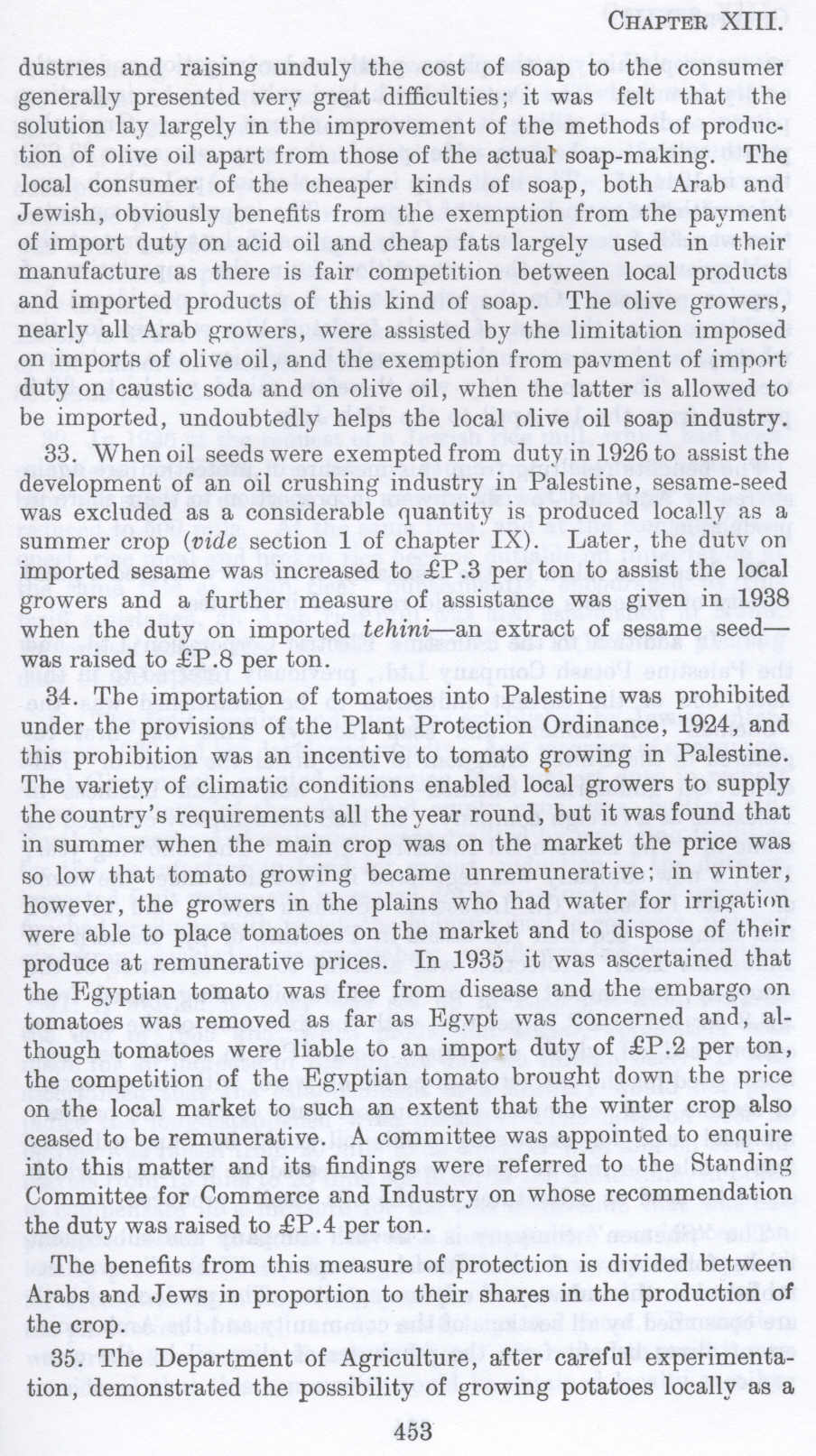| Prev | Next |  |
| Prev | Next |
| PalestineRemembered | About Us | Oral History | العربية | |
| Pictures | Zionist FAQs | Haavara | Maps | |
| Search |
| Camps |
| Districts |
| Acre |
| Baysan |
| Beersheba |
| Bethlehem |
| Gaza |
| Haifa |
| Hebron |
| Jaffa |
| Jericho |
| Jerusalem |
| Jinin |
| Nablus |
| Nazareth |
| Ramallah |
| al-Ramla |
| Safad |
| Tiberias |
| Tulkarm |
| Donate |
| Contact |
| Profile |
| Videos |
British Mandate: A Survey of Palestine: Volume I - Page 453 |
Disclaimer
The above documents, article, interviews, movies, podcasts, or stories reflects solely the research and opinions of its authors. PalestineRemembered.com makes its best effort to validate its contents.


Post Your Comment
*It should be NOTED that your email address won't be shared, and all communications between members will be routed via the website's mail server.
dustries and raising unduly the cost of soap to the consumer generally presented very great difficulties; it was felt that the solution lay largely in the improvement of the methods of production of olive oil apart from those of the actual soap-making. The local consumer of the cheaper kinds of soap, both Arab and Jewish, obviously benefits from the exemption from the payment of import duty on acid oil and cheap fats largely used in their manufacture as there is fair competition between local products and imported products of this kind of soap. The olive growers, nearly all Arab growers, were assisted by the limitation imposed on imports of olive oil, and the exemption from payment of import duty on caustic soda and on olive oil, when the latter is allowed to be imported; undoubtedly helps the local olive oil soap industry.
33. When oil seeds were exempted from duty in 1926 to assist the development of an oil crushing industry in Palestine, sesame-seed was excluded as a considerable quantity is produced locally as a summer crop (vide section 1 of chapter IX). Later, the duty on imported sesame was increased to £P .3 per ton to assist the local growers and a further measure of assistance was given in 193B when the duty on imported tehini-an extract of sesame seed was raised to £P .B per ton.
34. The importation of tomatoes into Palestine was prohibited under the provisions of the Plant Protection Ordinance, 1924, and this prohibition was an incentive to tomato growing in Palestine. The variety of climatic conditions enabled local growers to supply the country's requirements all the year round, but it was found that in summer when the main crop was on the market the price was so low that tomato growing became unremunerative; in winter, however, the growers in the plains who had water for irrigation were able to place tomatoes on the market and to dispose of their produce at remunerative prices. In 1935 it was ascertained that the Egyptian tomato was free from disease and the embargo on tomatoes was removed as far as Egypt was concerned and, although tomatoes were liable to an import duty of £P.2 per ton, the competition of the Egyptian tomato brought down the price on the local market to such an extent that the winter crop also ceased to be remunerative. A committee was appointed to enquire into this matter and its findings were referred to the Standing Committee for Commerce and Industry on whose recommendation the duty was raised to £P .4 per ton.
The benefits from this measure of protection is divided between Arabs and Jews in proportion to their shares in the production of the crop.
35. The Department of Agriculture, after careful experimentation, demonstrated the possibility of growing potatoes locally as a
Page 453